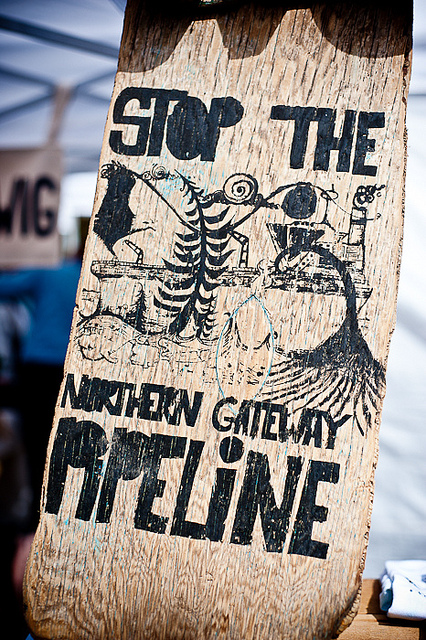Please support our coverage of democratic movements and become a monthly supporter of rabble.ca.
“My personal view is that these pipelines are a joke. I mean they are not pipelines, they are spill lines. Every single one spills.” — Shannon McPhail, Executive Director of the Skeena Watershed Conservation Coalition.
In the wake of yesterday’s federal government decision to approve the Northern Gateway pipeline, 12 peaceful protesters have occupied the office of Conservative MP James Moore in Port Moody, B.C. Today, Chris McCluskey, spokesperson for Natural Resources Minister Greg Rickford, tweeted that the 209 conditions that need to be met for the pipeline project to proceed make the Northern Gateway pipeline “a maybe,” as reported by Global News.
Enbridge, with its record of more than 800 pipeline spills in the space of a decade, has had its proposed Northern Gateway pipeline project approved by the Harper government. The project was rubber-stamped by the National Energy Board (NEB) earlier this year, but their approval is contingent upon Enbridge fulfilling 209 conditions before permits and licenses will be issued. Few trust that those conditions will be met. According to Murray Minchin, who is involved in Douglas Channel Watch, recently the NEB found Enbridge non-compliant in 117 out of 125 pumping stations for not having mandatory shut-off valves and secondary power sources.
When the Harper government made the announcement, there was no press conference, no Q&A, just a media release sent from the office of Natural Resources Minister Greg Rickford. Opposition leaders, in particular the NDP Leader of the Opposition Tom Mulcair, have vowed to reverse the decision if and when they gain power in the 2015 federal election.
The proposed 1,177 kilometres of pipeline, beginning just north of Edmonton, in Bruderheim, is projected to carry 525,000 barrels of toxic and corrosive bitumen, from the Alberta tar sands west to a terminal on the coast of B.C. at Kitimat.
A second pipeline will flow west to east, carrying the highly carcinogenic condensate that tar sands producers will use to dilute the bitumen, which will allow the tar sands heavy, sludge-like product to flow through the main pipeline. But the problem doesn’t end with the hazards posed by the pipeline and its inevitable spills. There will be supertankers waiting, in waters difficult to navigate even by much smaller vessels, waiting to take tar sands product to its market in Asia.
In order for tankers to reach the terminal in Kitimat they must navigate the narrow, twisty Douglas Channel, a feat for even the most experienced tanker pilot. But the tankers that will be used to carry tar sands product aren’t the usual tankers that navigate the waters around Kitimat — they’re supertankers, an entirely different animal. These behemoths will squeeze their way through the environmentally sensitive channel to pick up hundreds of thousands of barrels of diluted bitumen (dilbit) every day.
Enbridge has projected to use 225 tankers per day to start, and will then ramp up to 360 or more when the tar sands production rates rapidly increase and the pipeline begins delivering up to 850,000 barrels per day. Anyone remembering the Exxon Valdez disaster would be rightly horrified by the prospect of so much tar sands product being shipped on a daily basis in a sensitive area where spills are all but inevitable.
While the idea that this project will go ahead seems to be sheer folly on a massive scale, people remain optimistic. Some 160 northwestern B.C. First Nations are fighting Northern Gateway, and they have already seen some success in slowing or halting other projects that threaten their traditional lands.
Jasmine Thomas, a Dene woman of the Frog Clan working with such groups as the Yinka Dene Alliance and the Indigenous Environmental Network told interviewers Paul Bowles and Henry Veltmeyer (The Answer is Still No: Voices of Pipeline Resistance) that, “[First Nations communities] will use whatever means necessary to make sure that this project doesn’t threaten our future.” She said, “Our chiefs have mentioned that they would put their bodies on the line. They will be in front of those bulldozers.” She also added that no one wanted it to get to that point.”
For Jasmine, it will be the women who will be leaders in the fight against the pipeline. “The Frog Clan is matrilineal, so everything is passed through the women.” She explains that many in the communities have lost their voices, and it is the role and duty of women to help them find their voices again and step up to the fight against the Northern Gateway pipeline.
Meg Borthwick is a freelance writer and moderator for rabble’s discussion forum, babble.
Photo: Caelie_Frampton/flickr




